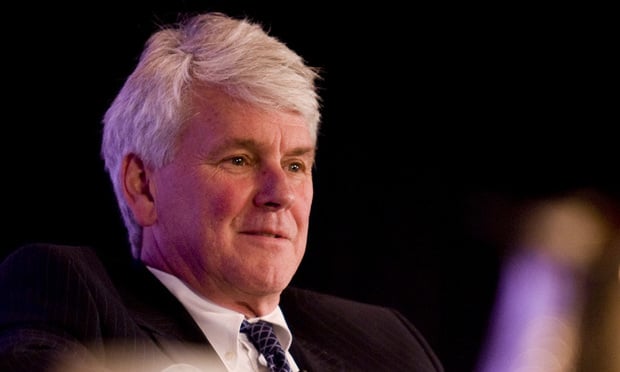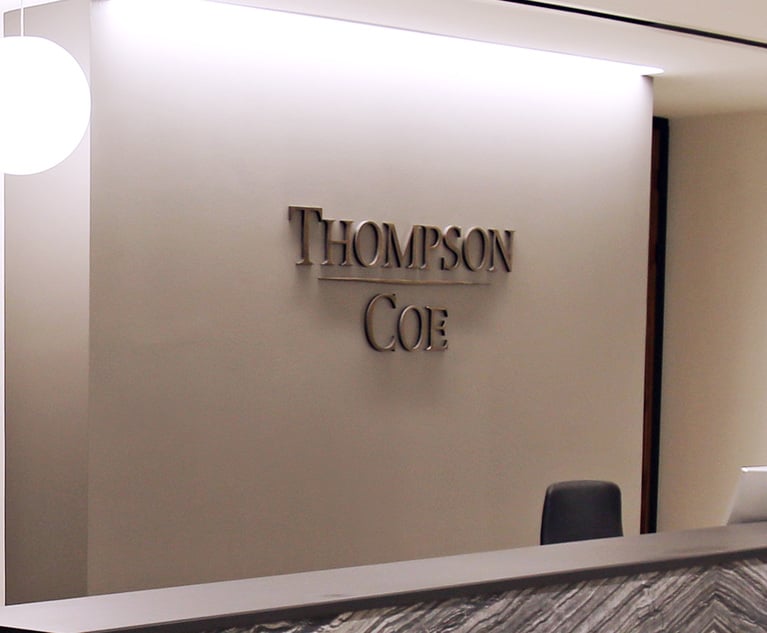Skadden Keeps Mum Over Claims It Bowed to Pressure to Hire Manafort's Daughter
The firm hasn't commented on claims that it reversed course and hired Paul Manafort's daughter at the urging of former partner Gregory Craig. One observer called the scenario "highly unusual."
May 13, 2019 at 06:00 PM
5 minute read
 Gregory Craig. Photo: Diego M. Radzinschi/ALM
Gregory Craig. Photo: Diego M. Radzinschi/ALM
The U.S. government's prosecution of former Skadden, Arps, Slate, Meagher & Flom partner Gregory Craig was always bound to be an unpleasant experience for the powerhouse law firm.
A late Friday filing in the case illustrates one more reason why. Federal prosecutors say they plan to introduce evidence that former Trump campaign chairman Paul Manafort pressured Craig to intervene after Skadden initially refused to hire Manafort's ”immediate relative” as an associate. According to the filing, upon Craig's urging, the firm later acceded to the 2012 hire.
While the Washington, D.C., federal court filing doesn't give the name of Manafort's relative, his daughter Andrea Shand worked at the firm as an associate from October 2012 to October 2016, according to LinkedIn and prior ALM reporting,
Neither Skadden nor Craig's attorney, Zuckerman Spaeder partner William W. Taylor III, responded to requests for comment Monday.
Craig, a former White House counsel for President Barack Obama, was charged in April with making false statements to the Justice Department in connection with his work for Ukraine. He was allegedly hired by Manafort, whose consulting work for the pro-Russian government of Viktor Yanukovych ultimately led to Manafort's indictment and subsequent conviction for tax and bank fraud as part of special counsel Robert Mueller's investigation.
 Paul Manafort departing U.S. District Court for the District of Columbia, Nov. 2, 2017. Photo: Diego M. Radzinschi/ALM
Paul Manafort departing U.S. District Court for the District of Columbia, Nov. 2, 2017. Photo: Diego M. Radzinschi/ALMCraig, who has denied engaging in any lobbying activity for Ukraine, is fighting two counts of providing false statements to federal investigators. Federal prosecutors said Friday they expect Craig to argue that he reached out to a reporter from The New York Times in 2012 to advocate for himself and his firm, not Ukraine and that consequently he was under no obligation to register as a lobbyist under the Foreign Agents Registration Act.
Prosecutors say the story of Manafort's daughter's application to work at Skadden shows otherwise.
“Just as Craig had a motive to persuade Skadden to hire Manafort's relative in order to satisfy Manafort and continue to bring in his high-paying business, Craig had a motive to curry Manafort's favor by reaching out to reporters as Manafort, Ukraine and Ukraine's public relations firm had requested,” the filing said.
According to the government, Skadden initially declined to hire Shand following her 2012 graduation from Georgetown University Law Center.
Manafort then sent Craig an angry email, accusing his firm of failing to “show appreciation for a $4MILLION gift account.” Skadden in January agreed to to pay $4.6 million—the equivalent of what the firm received from Ukraine—to the U.S. Department of Justice to resolve claims that it violated FARA.
Prosecutors said that Craig then emailed his colleagues at the firm, saying the decision “could not have come at a worse time for our case.”
According to the filing, that was enough to land Shand a new interview with the firm. On the day of the interview, Manafort wrote to Craig, saying “[i]t goes without saying that I will push all future business to wherever [my relative] lands. So, the four million dollar contract can be viewed as just the beginning.”
Then, according to prosecutors, Craig answered a senior Skadden partner who had asked what to do about Manafort's relative with the message that he wanted the firm to make her an offer. Craig next drafted a memorandum, highlighting the relative's strengths, performance in the interview, as well as the “potential for significant future business” with Paul Manafort. The firm ultimately made an offer, and Manafort expressed “profuse gratitude” to Craig, the government asserted.
Shand did not immediately respond to a request for comment Monday.
New York University School of Law professor Stephen Gillers, who teaches on the subject of ethics and evidence, questioned the relationship between Craig's alleged misrepresentations over his FARA obligations and his alleged intervention in a hiring decision, adding that the filing could actually fuel doubts over the overall strength of the government's case.
“One kind of 'dishonesty' is far removed from the other,” he said in an email. “Letting the jury know that Craig facilitated an offer to Manfort's daughter, whom the firm initially found wanting but who will now be working for its clients, will unfairly prejudice Craig even if his actions had some remote probative value.”
And he said that the move did not overstep any ethical lines, voicing the suspicion that firms often take similar actions for favored clients, particularly for lower level employees and summer jobs.
But Zeughauser Group consultant Kent Zimmermann called the scenario described in the filing “highly unusual.”
He said that while it is common for clients to weigh in on promotion decisions of attorneys already within a firm, any sort of intervention generally happens before a decision is made, via a letter on the lawyer's behalf.
“If it's a really big or strategic client, that might have some influence,” he said.
But that's not what the government is describing.
“Appealing a decision is less typical, and actually changing the decision because of what the client says would be even more atypical,” Zimmermann added.
Read More
Ex-Partner's Fight Against Lobbying Charges to Put Skadden Back in Limelight
This content has been archived. It is available through our partners, LexisNexis® and Bloomberg Law.
To view this content, please continue to their sites.
Not a Lexis Subscriber?
Subscribe Now
Not a Bloomberg Law Subscriber?
Subscribe Now
NOT FOR REPRINT
© 2025 ALM Global, LLC, All Rights Reserved. Request academic re-use from www.copyright.com. All other uses, submit a request to [email protected]. For more information visit Asset & Logo Licensing.
You Might Like
View All
KPMG Wants to Provide Legal Services in the US. Now All Eyes Are on Their Big Four Peers



K&L Gates Sheds Space, but Will Stay in Flagship Pittsburgh Office After Lease Renewal
Trending Stories
- 1'It's Not Going to Be Pretty': PayPal, Capital One Face Novel Class Actions Over 'Poaching' Commissions Owed Influencers
- 211th Circuit Rejects Trump's Emergency Request as DOJ Prepares to Release Special Counsel's Final Report
- 3Supreme Court Takes Up Challenge to ACA Task Force
- 4'Tragedy of Unspeakable Proportions:' Could Edison, DWP, Face Lawsuits Over LA Wildfires?
- 5Meta Pulls Plug on DEI Programs
Who Got The Work
Michael G. Bongiorno, Andrew Scott Dulberg and Elizabeth E. Driscoll from Wilmer Cutler Pickering Hale and Dorr have stepped in to represent Symbotic Inc., an A.I.-enabled technology platform that focuses on increasing supply chain efficiency, and other defendants in a pending shareholder derivative lawsuit. The case, filed Oct. 2 in Massachusetts District Court by the Brown Law Firm on behalf of Stephen Austen, accuses certain officers and directors of misleading investors in regard to Symbotic's potential for margin growth by failing to disclose that the company was not equipped to timely deploy its systems or manage expenses through project delays. The case, assigned to U.S. District Judge Nathaniel M. Gorton, is 1:24-cv-12522, Austen v. Cohen et al.
Who Got The Work
Edmund Polubinski and Marie Killmond of Davis Polk & Wardwell have entered appearances for data platform software development company MongoDB and other defendants in a pending shareholder derivative lawsuit. The action, filed Oct. 7 in New York Southern District Court by the Brown Law Firm, accuses the company's directors and/or officers of falsely expressing confidence in the company’s restructuring of its sales incentive plan and downplaying the severity of decreases in its upfront commitments. The case is 1:24-cv-07594, Roy v. Ittycheria et al.
Who Got The Work
Amy O. Bruchs and Kurt F. Ellison of Michael Best & Friedrich have entered appearances for Epic Systems Corp. in a pending employment discrimination lawsuit. The suit was filed Sept. 7 in Wisconsin Western District Court by Levine Eisberner LLC and Siri & Glimstad on behalf of a project manager who claims that he was wrongfully terminated after applying for a religious exemption to the defendant's COVID-19 vaccine mandate. The case, assigned to U.S. Magistrate Judge Anita Marie Boor, is 3:24-cv-00630, Secker, Nathan v. Epic Systems Corporation.
Who Got The Work
David X. Sullivan, Thomas J. Finn and Gregory A. Hall from McCarter & English have entered appearances for Sunrun Installation Services in a pending civil rights lawsuit. The complaint was filed Sept. 4 in Connecticut District Court by attorney Robert M. Berke on behalf of former employee George Edward Steins, who was arrested and charged with employing an unregistered home improvement salesperson. The complaint alleges that had Sunrun informed the Connecticut Department of Consumer Protection that the plaintiff's employment had ended in 2017 and that he no longer held Sunrun's home improvement contractor license, he would not have been hit with charges, which were dismissed in May 2024. The case, assigned to U.S. District Judge Jeffrey A. Meyer, is 3:24-cv-01423, Steins v. Sunrun, Inc. et al.
Who Got The Work
Greenberg Traurig shareholder Joshua L. Raskin has entered an appearance for boohoo.com UK Ltd. in a pending patent infringement lawsuit. The suit, filed Sept. 3 in Texas Eastern District Court by Rozier Hardt McDonough on behalf of Alto Dynamics, asserts five patents related to an online shopping platform. The case, assigned to U.S. District Judge Rodney Gilstrap, is 2:24-cv-00719, Alto Dynamics, LLC v. boohoo.com UK Limited.
Featured Firms
Law Offices of Gary Martin Hays & Associates, P.C.
(470) 294-1674
Law Offices of Mark E. Salomone
(857) 444-6468
Smith & Hassler
(713) 739-1250










